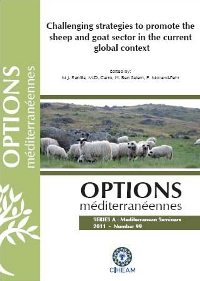| Article précédent | p. 163-168 | Article suivant |
The effect of olive, sunflower or linseed oils on the fermentation pattern and methane production in the rumen simulating technique
The objective of this study was to investigate the effects of the addition of different vegetable oils to the diet on the fermentation pattern and methane production in Rusitec fermenters. For this purpose four treatments were randomly allocated to sixteen fermenters in a completely random design. Inoculum was obtained from four ruminally fistulated Merino sheep fed lucerne hay and concentrate. Treatments were defined by the diet supplied to the fermenters, so that the control treatment (C) diet was a total mixed ration for ewes on lactation. In the other experimental treatments the control diet was supplemented with olive oil (OO), sunflower oil (SO) or linseed oil (LO) to reach a final concentration of 50 g oil/kg diet. After 7 days of adaptation, samples of effluent, fermenters' fluid content and digesta of each fermenter were collected during 10 days. There were no significant differences (P>0.05) between treatments in pH values in the fermenters' fluid content. The LO diet showed (P<0.05) the highest dry matter, organic matter and NDF disappearance. The lowest values were observed with the SO diet (P<0.05). However, there were no differences for ADF disappearance (P>0.05). All three oils reduced methane production compared with control cultures (P<0.05), but there were no differences in the daily gas production. There were no differences in acetate production. The LO diet gave rise to the highest and the control diet the lowest propionate production (P<0.05), whereas butyrate production decreased as a result of any oil addition. The acetate to propionate ratio was also decreased by any oil addition. There were no significant effects (P>0.05) of oil supplementation on Llactate concentration. Ammonia N concentration was higher (P<0.05) in the control treatment, but there were no significant differences between treatments in microbial protein output. In conclusion, these results indicate that fermentation pattern is affected by oil supplementation mainly by decreasing the acetate to propionate ratio, as well as methane production.
L'objectif de ce travail était d'étudier les effets de 3 huiles végétales sur le patron de fermentation et la production de méthane dans le système RUSITEC. Nous avons évalué 4 traitements, appliqués à 16 fermenteurs selon un dispositif complètement aléatoire. L'inoculum a été obtenu de 3 brebis Mérinos alimentées à base de foin de luzerne et de concentré. Le traitement témoin (C) correspond à une ration complète pour des brebis en lactation. Concernant les autres traitements, le régime témoin a été supplémenté avec 50 g/kg d'huile d'olive (AO), d'huile de tournesol (AG) ou d'huile de lin (AL). Après 7 jours d'adaptation, des échantillons d'effluents, de liquide des fermenteurs et de digesta ont été prélevés pendant 10 jours. Aucune différence significative (P>0.05) du pH du contenu liquide des fermenteurs n'a été constatée entre les différents traitements. Le régime AL a montré (P<0.05) disparition plus importante de matière sèche, matière organique et FDN. Les plus faibles taux de disparition ont été obtenues avec le régime AG (P<0.05). Néanmoins, il n'y a pas eu des différences au niveau de la disparition de FDA (P>0.05). En comparaison avec le traitement témoin, les 3 huiles ont réduit la production de méthane (P<0.05), mais il n'y a pas eu des différences dans la production de gaz et de l'acide acétique. La plus importante et la plus faible production de propionate ont été obtenues, respectivement, avec les traitements témoin et AL (P<0.05). La production de butyrate et le rapport acétate : propionate ont chuté avec l'addition des trois huiles. On n'a pas trouvé d'effets significatifs (P>0.05) de la complémentation avec des huiles sur la concentration de lactate. La concentration d'azote ammoniacal la plus élevée a été obtenue avec le régime témoin (P<0.05). Cependant, Les différents traitements ont abouti à la même synthèse des protéines microbiennes. En conclusion, ces résultats indiquent que la fermentation est affecté avec l'incorporation des huiles dans la ration en réduisant le rapport acétate : propionate et la production de méthane.
- [ Afficher ]
- [ Télécharger ]
- [ Exporter la citation ]
Vous pouvez télécharger la citation au format :
- [ Imprimer ]
-
Mots-clés
HUILE VEGETALE, METHANE, ACIDE GRAS VOLATIL, FERMENTEURCiter cet article
Vargas J.E., Andrés S., Yáñez Ruiz D.R., López S. The effect of olive, sunflower or linseed oils on the fermentation pattern and methane production in the rumen simulating technique. In : Ranilla M.J. (ed.), Carro M.D. (ed.), Ben Salem H. (ed.), Morand-Fehr P. (ed.). Challenging strategies to promote the sheep and goat sector in the current global context. Zaragoza : CIHEAM / CSIC / Universidad de León / FAO, 2011. p. 163-168. (Options Méditerranéennes : Série A. Séminaires Méditerranéens; n. 99). 13. International Seminar of the Sub-Network on Nutrition of the FAO-CIHEAM Inter-Regional Cooperative Research and Development Network on Sheep and Goats, 2009/10/14-16, León (Spain). http://om.ciheam.org/om/pdf/a99/00801551.pdf



